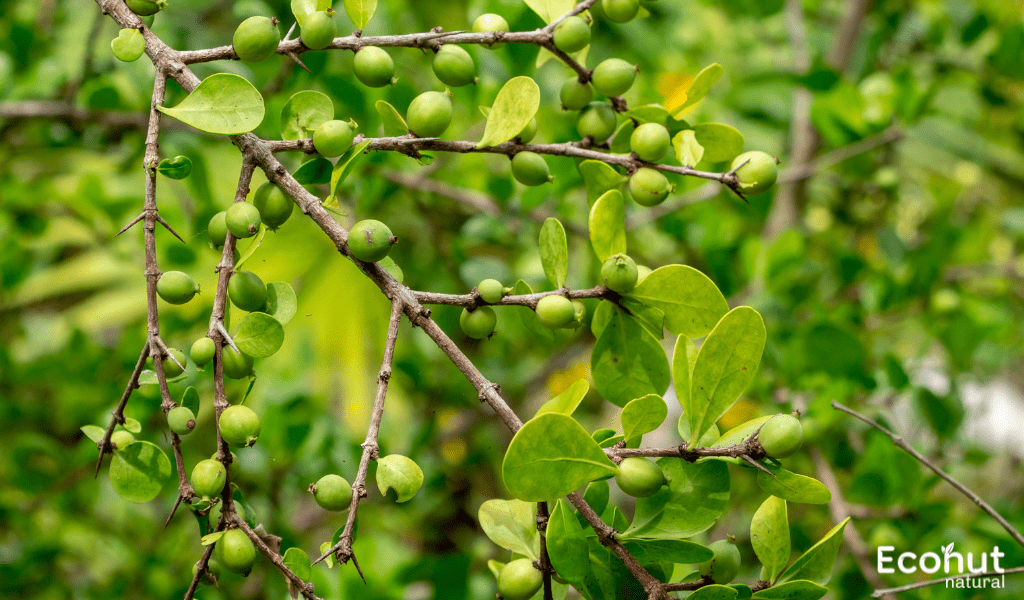Madanaphala (Randia dumetorum) is refered as Emetic Nut or Randia dumetorum, is a plant native to the Indian subcontinent and Southeast Asia. It regarding to the family Rubiaceae. The name “Madanaphala” is derived from Sanskrit, where “Madana” means intoxication and “phala” means fruit, indicating its emetic properties.
Discription
Madanaphala, commonly known as Emetic Nut or Randia dumetorum, is a plant species native to the Indian subcontinent and parts of Southeast Asia. Here, We discuss some charactristics of the plant.
Fruit:
The fruit of the Madanaphala plant is its most notable feature. It is a round, fleshy berry that turns from green to yellow-orange when ripe. The fruit contains several seeds embedded in pulp.
Habitat:
Madanaphala is often found in tropical and subtropical regions, growing in forests, scrublands, and disturbed areas. It prefers well-drained soils and can tolerate a range of environmental conditions.
Part Used:
- Roots
- Fruits
Botanical Characteristics:
Madanaphala is a small to medium-sized shrub, typically growing up to 2-3 meters in height. It belongs to the family Rubiaceae, which includes coffee and gardenia plants. The plant has glossy green leaves that are arranged oppositely along the stem. The flowers are small, white, and fragrant, with a tubular shape, characteristic of many plants in the Rubiaceae family.
Dosage:
- Therapeutic – 1 gram
- Vomiting therapy – 3-6 g
Conservation Status:
In some regions, Madanaphala may face threats due to habitat loss and overexploitation for medicinal purposes. Conservation efforts may be needed to ensure its sustainable use and preservation in the wild.
Vernacular Names
Botanical name: Randia dumetorum
Common name: Madanaphala
Bengali: Manphal, Mayanaphala
Marathi: Gel, Gelphala, Madanaphala
Gujarati: Mindhal, Mindhol, Mindhar
Kannada: Mangarikai, Karigidda, Kari
Malayalam: Malankara, Malamkarakka
Punjabi: Mindhal, Rara, Manphal
Telugu: Mrangakaya, Mongakaya
Assam’s: Maen, Behmona
Tamil: Marukkarai
Urdu: Mainfal, Jauz-ulQai
English: Emetic nut tree
Kashmiri: Madanfal
Oria: Palova
Arabic: Jauzulaki, Ji jul kai
Scientific Classification
| Kingdom | Plantae |
| Sub Kingdom | Tracheobionata |
| Super division | Spermatophyta |
| Division | Magnaliophyta |
| Class | Magnoliopsida |
| Sub Class | Asteridae |
| Order | Rubiales |
| Family | Rubiaceae |
| Genus | Randia |
| Species | Dumetorum |
Ayurvedic Properties
Hindi / Sanskrit
- Rasa, Tikta, Madhura
Guna, Laghu, Rooksha
Virya, Ushna
Vipaka, Katu
English
- Taste, Bitter, Sweet
Metabolic Property (After Digestion), Pungent
Physical Property, Light, Dry
Potency, Hot
Benefits of Madanaphala, Emetic Nut (Randia dumetorum)
Madanaphala reffered as Emetic Nut or Randia dumetorum, is a plant with several traditional medicinal uses. Here, We are discuss some of the most benefits regarding Madanaphala.
Contains Emetic Elements:
This herb is primarily known for its emetic elements, meaning it induces vomiting. In traditional medicine systems like Ayurveda, this action is considered useful for expelling toxins or unwanted substances from the body. It’s often used in cases of poisoning or overdose.
Opposes inflammatory:
Some medical report suggest that Madanaphala possesses anti-inflammatory elements. This elements make it useful in the management of inflammatory conditions like arthritis or inflammatory bowel disease.
Helpful In curing vomiting and diarrhoea:
This herb is useful in curing vomiting and diarrhoea. Leaves of Madanaphala seeds hot liquied can be given to patients suffering from vomiting and diarrhea. It can also help to relief from bulkiness, headache, nausea, lethargy, etc.
Rich In Antimicrobial Properties:
Medical studies indicate that Madanaphala extracts may have antimicrobial activity against certain bacteria and fungi. This suggests its potential in fighting infections.
Useful to Treat Skin Diseases:
Randia dumetorum is a great herb for curing skin diseases. Fresh root of Madanaphala and lemon juice prepared paste from the can be applied over the affected area to get relief from skin diseases.
Contain Analgesic Elements:
There is some traditional use of Madanaphala as an analgesic, which means it may help relieve pain. However, more research is needed to confirm this effect.
Antioxidant Properties:
Some Medical report suggests that Madanaphala possesses antioxidant properties, which can help neutralize harmful free radicals in the body. This antioxidant activity may contribute to its overall health benefits.
Beneficial For Gastrointestinal System:
This herb is used to treat various gastrointestinal disorders, including indigestion, bloating, and diarrhea. Its emetic and anti-inflammatory properties may help alleviate symptoms associated with these conditions.
Useful To Reduce Fever:
This herb has been used as an antipyretic, meaning it may help reduce fever. This property could be attributed to its ability to induce sweating and its potential effects on the immune system.
Helps Skin Disorders:
In Ayurveda, This herb used externally for the treatment of certain skin disorders like eczema, itching, and inflammation. Its anti-inflammatory and antipruritic elements are believed to be beneficial in these conditions.
Also More: Agaru (Aquillaria Agallocha)
Side Effects of Madanaphala, Emetic Nut (Randia dumetorum)
Madanaphala, also known as Emetic Nut or Randia dumetorum, is a plant commonly used in traditional Ayurvedic medicine. However, its use should be approached with caution due to potential side effects. Here, We discuss Some of side effects regarding Madanaphala.
Produces Abdominal discomfort:
Some people may experience abdominal pain or discomfort after consuming Madanaphala.
Lead to Dehydration:
Prolonged vomiting and diarrhea can lead to dehydration, which may require medical attention.
Produces Allergic reactions:
Like any medicinal plant, Madanaphala can trigger allergic reactions in susceptible peoples. Symptoms of an allergic reaction may include itching, rash, swelling, and difficulty breathing.
High Dosage May be toxic for Liver and kidney:
Large Dasage of Madanaphala may potentially cause liver or kidney toxicity in some individuals, particularly if taken in large doses or for an extended period.
Avoid During Pregnancy and breastfeeding:
The safety of Madanaphala during pregnancy and breastfeeding hasn’t been well studied. Pregnant and breastfeeding women should avoid using Madanaphala unless specifically recommended by a healthcare provider.
Nausea and vomiting Issue:
As an emetic herb, Madanaphala can induce vomiting. While this can be therapeutic in certain contexts, excessive vomiting can lead to dehydration and electrolyte imbalances.
Diarrhea Issue:
Overuse or sensitivity to Madanaphala can cause diarrhea, leading to fluid loss and electrolyte disturbances.
Occur Electrolyte imbalances Problems:
Loss of fluids through vomiting and diarrhea can disrupt electrolyte balance in the body, potentially leading to complications such as weakness, dizziness, and cardiac abnormalities.
Medicine interactions:
This herb may interact with certain medications, potentiating their effects or causing adverse reactions. It’s essential to consult a healthcare professional before using Madanaphala, especially if you’re taking other medications.
Conclusion
Madanaphala, commonly known as Emetic Nut or Randia dumetorum, is a plant with a long history of traditional medicinal use, particularly as an emetic agent. While Madanaphala demonstrates promising pharmacological properties, including anti-inflammatory and antioxidant effects, its use must be approached cautiously due to reported adverse reactions such as gastrointestinal distress and toxicity.
FAQS
What is Madanphala used for in Ayurvedic medicine?
This herb is used in Ayurveda for its digestive and carminative elements. It’s used to treat digestive issue such as indigestion, flatulence, and abdominal pain.
What are the health benefits of Madanphala?
Madanphala is believed to have several health benefits, including improving digestion, relieving constipation, reducing abdominal pain and discomfort, and promoting overall gastrointestinal health.
Are there any side effects associated with Madanphala?
Excessive consumption of Madanphala may cause nausea, vomiting, and diarrhea in some individuals. It’s important to follow recommended dosage guidelines and consult a healthcare professional before using Madanphala, especially if you have any underlying health conditions or are pregnant or breastfeeding.

